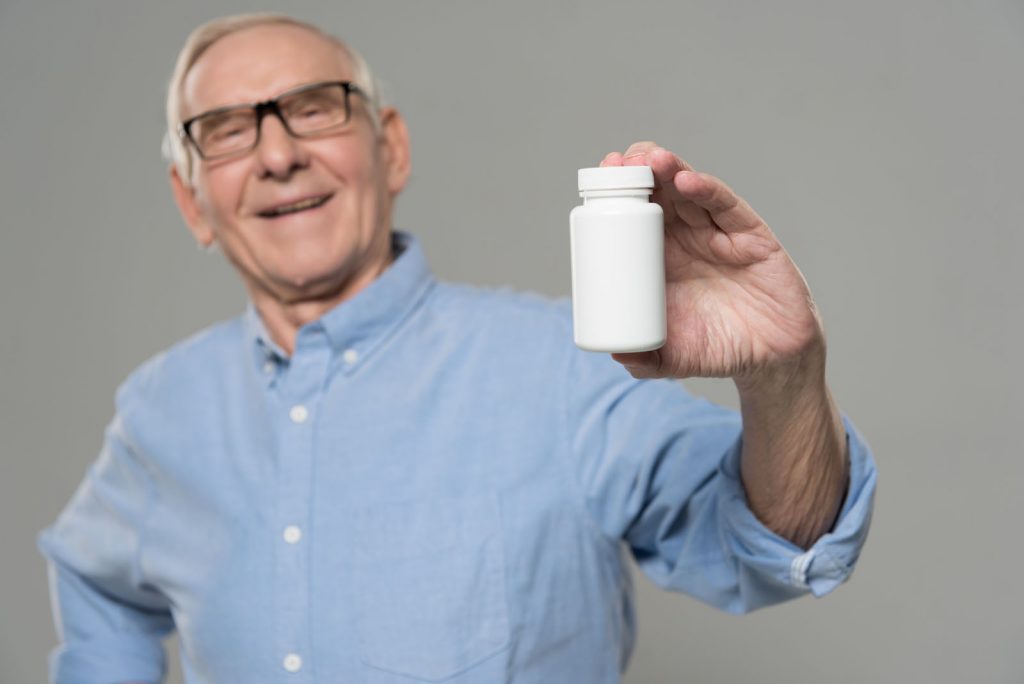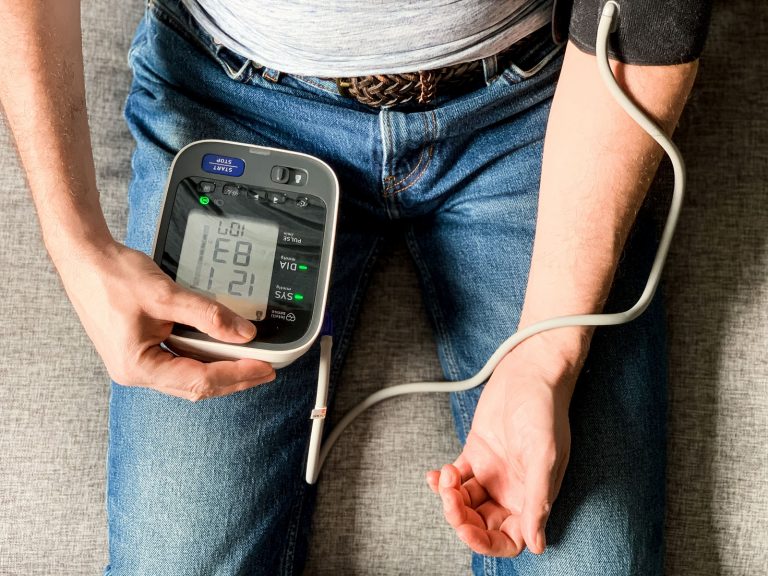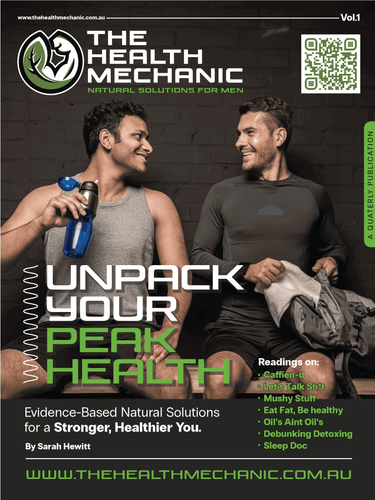Boost testosterone levels naturally and understand the causes of low testosterone. Find out how to increase testosterone and reduce signs of low testosterone
Understanding Low Testosterone: Tips for Men's Health

Key Takeaways
- Functional medicine provides a comprehensive approach: Advanced testing, dietary recommendations, and targeted supplementation can help you optimise glucose metabolism.
- Testosterone is essential for men's health – it impacts libido, muscle mass, energy, mood, and overall well-being.
- Low testosterone is more common than you think – up to 40% of older men and 20% of younger men (15-39) have low levels.
- It's not just about age – stress, obesity, poor sleep, and lifestyle choices all play a role in testosterone decline.
- Symptoms are often overlooked – fatigue, low sex drive, erectile dysfunction, and reduced muscle mass are signs of low T.
- Testing matters – testosterone levels fluctuate throughout the day, so testing should be done in the morning for accuracy.
- More than just testosterone – hormone balance is key, and other factors like cortisol, vitamin D, and zinc play a role.
- Natural solutions exist – herbs like Trigonella, Tribulus, and Turnera diffusa, along with diet, exercise, and stress management, can all help boost testosterone naturally.
- Integrative approach over quick fixes – addressing root causes and optimising health leads to lasting improvements.
Introduction- Why Testosterone Matters
Testosterone plays a huge role in men’s health, influencing everything from sex drive and muscle mass, to erectile function. When levels dip too low, it impacts every part of your life. And with a recent study of 24,000 men showing that low testosterone is linked to an elevated risk of death from all causes- it’s very clear that understanding and overcoming testosterone deficiency is essential for staying on top of your health.
Despite the key role testosterone plays, it should never be considered alone. Testosterone levels are part of an intricate web of hormones and other biochemical signalling molecules which are all players working together to maintain the functions of your body. A bit more of one means less of another! An example of this is when oestrogen is produced by excess adipose tissue- which leads to reduced testosterone.
In this article, we’ll break down why testosterone is so important, how it works in your body, and what can be done to normalise your levels.
The Low-Down On Testosterone Deficiency
In Australia, plenty of men worry about their testosterone levels- and for good reason. Lifestyle habits, stress, and aging all take a toll on T levels, and can lead to a dip in this vital hormone. Recent studies are sounding the alarm on men’s hormones, due to an increase in cases of low testosterone. Testosterone deficiency is now observed in up to 40% of older adult males, and in 20% of young adult men (aged 15-39 years).
Why Is Testosterone Important?
Testosterone is a cornerstone of men’s health, and is far more than just a male sex hormone. Low levels of testosterone are linked to increased risk of obesity, diabetes, and cardiovascular issues.
When testosterone decreases, it can bring serious health challenges like lower sex drive, fatigue, and erectile dysfunction. Additionally, testosterone supports bone density and muscle mass, both of which decline when levels are insufficient. It also plays a vital role in regulating mood, cognitive function, and energy levels- meaning that low levels can lead to fatigue, low motivation, and even depressive symptoms.

What Is Normal Testosterone?
The standard reference ranges for calculated free testosterone (cFT) which are considered normal in Australian men are:
- Younger men: 260–740 pmol/L
- Older men: 91-579 pmol/L
As you can see, these ranges of normal testosterone levels are incredibly broad and I’m sure you can appreciate that how a man might feel and perform at 100pmol/L is going be substantially different to if his levels were sitting at 600pmol/L. So although a medical practitioner in Australia might consider you to have “enough testosterone” if you are sitting just in range…. do you really?
We see it a little differently. “Enough” isn’t good enough for us in the functional medicine space optimal health is our goal.
Beyond Age: Why Low Testosterone Flies Under The Radar
In addition to the extremely broad standard reference ranges, low testosterone often slips through the cracks because its symptoms (like fatigue or a lower sex drive) are brushed off and normalised as “just getting older.” But here’s the thing: these signs aren’t always about normal aging. Younger men can also experience lower levels of testosterone, and it’s crucial to identify. The solution? Raising awareness about the possibility of hormone imbalances and low testosterone at every age to ensure the right diagnosis and treatment.
Timing is another piece of the puzzle. Testosterone levels naturally fluctuate throughout the day, hitting their peak in the morning. I always highlight to my patients the importance of blood tests being conducted at the same time, and in the same circumstances. That’s why I always recommend that testosterone be tested between 8-10am in the morning. Testing under the same conditions each time is a small but crucial detail that can make a big difference in getting an accurate read on your T levels.
Recognising the Signs: From Fatigue to Infertility
This hormone is essential for sperm production, a healthy libido, and overall strength and vitality. Addressing low testosterone isn’t just about improving one aspect of health- it’s about reducing broader health risks and enhancing your quality of life.
Men with low testosterone might see signs such as unexplained fatigue, loss of muscle mass, or trouble keeping an erection. If you have symptoms of low testosterone, reach out to a qualified healthcare provider.

Getting To The Root Cause of Low Testosterone
Pinpointing the cause of low testosterone is key to effective management. Factors like chronic stress, underlying medical conditions, and lifestyle habits all play a role. In particular, obesity and smoking can fast-track a drop in androgen levels (the group of hormones that includes testosterone).
By uncovering the root causes of low T, we can tailor treatment plans to suit each individual’s needs. This personalised approach doesn’t just improve testosterone levels- it helps restore overall hormone balance, boosting health and well-being. Understanding why testosterone is low allows for more targeted treatments and paves the way for lasting improvement.

Comprehensive Testing: Beyond Testosterone Levels
Comprehensive testing involves more than just checking testosterone. At The Health Mechanic, we look at an array of health markers, which includes sex hormones, but also cortisol and its metabolites, blood pressure, and vitamin D and zinc levels. We also consider lifestyle habits, such as stress and nutrition, weight control, sleep and exercise regimes. Did you know that reducing sleeping time to 5 hours per day can lower testosterone levels by 10–15%?!
This thorough approach helps us identify the reasons for low T, and ensures the treatment plan reflects the needs of each patient.
Treatment Approaches- What Increases Testosterone?
Addressing low T levels requires a tailored approach, and integrative medicine offers a broad, and more holistic perspective over focusing solely on testosterone therapy. We consider what the contributing causes to lower testosterone levels might be for the individual patient. In fact, the Royal Australian College of General Practitioners advises that managing moderately low T in older men with obesity and chronic health issues should prioritise weight loss and addressing co morbidities over resorting to testosterone replacement therapy (TRT). It’s just out of the realm of possibility for GP’s to coach each patient through the behavioural changes required for health improvement- but that’s where us nutritionists come in!
While TRT can deliver quick results by supplementing low hormone levels, it also may come with potential side effects and long-term considerations that warrant careful evaluation. Ultimately, the decision between integrative and conventional methods depends on individual preferences, and any underlying conditions. Consulting with healthcare professionals skilled in both approaches allows individuals to explore their options fully and make informed choices tailored to their own unique needs.
What Are Natural Testosterone Boosters?
As I have mentioned, there’s more to testosterone than just testosterone! However, here are some examples of the herbal supports I may use with my patients in clinic to increase testosterone naturally. Once again, please note that every patient is different and some herbs and nutrients are contraindicated in medical conditions or with use of some pharmaceuticals.
- Trigonella foenum-graecum
Trigonella (commonly known as fenugreek) is a herb with considerable research backing its ability to support testosterone levels. Fenugreek seeds contain compounds like saponins (particularly one called diosgenin), which have shown to have a beneficial effect on testosterone.
A randomised, double-blind study found that Trigonella can demonstrate significant anabolic and androgenic activity. The group taking a fenugreek supplement experienced a significant increase in T levels, and improvements in strength and body composition. A systematic review corroborated these results. Trigonella was found to have positive effect on muscle performance, post exercise recovery, and strength as well as improved lean body mass and a reduction in body fat.
Another systematic review evaluated the effects of fenugreek seed extract on testosterone concentration, with four of six studies showing significant increases in total testosterone (TT) and free testosterone (FT). Positive outcomes were observed primarily in healthy men.
- Tribulus terrestris
Tribulus has been use for centuries to enhance sexual function, vitality, and physical performance and remains one of the most popular herbs used to boost T levels- particularly in sports and bodybuilding circles. The herb contains steroidal saponins, which appear to have the ability to enhance the body’s natural production of testosterone.
A systematic review on the effects of Tribulus on physically active adult males found significant improvement in the T levels of all 5 studies analysed. One potential reason for its efficacy may be its ability to balance other hormones, such as DHEA (dehydroepiandrosterone), which is a precursor to testosterone.
Further research on Tribulus suggests the herb can improve sexual function. A study reviewed the effects of Tribulus on men with mild to moderate erectile dysfunction, and found that there was significant improvements in erection, libido, and orgasmic function after a 12 week period.
Both Tribulus and Trigonella have the added benefit of potentially balancing other hormones such as insulin, which is crucial for men with low testosterone, as insulin resistance can be linked to decreased testosterone levels.
- Turnera diffusa
Turnera diffusa or “damiana” has a long history of use in traditional medicine for sexual dysfunction, and as an aphrodisiac and hormone-balancing herb. Despite more studies being needed to substantiate the exact mechanism of the effectiveness, clinical evidence has shown that damiana has the ability to support libido and improve sexual function.
Research shows that constituents of Turnera substantially suppress aromatase, which leads to higher levels of T. Another study found that Turnera extract can improve testosterone, libido and sexual function in male rats.
Additionally, damiana is thought to have adaptogenic properties, helping the body cope with stress- which is crucial because chronic stress can significantly impact T levels by elevating cortisol.
Supplements for Increasing Testosterone- Why Didn't They Work?
In herbal medicine, the efficacy of a supplement can vary widely due to factors that influence the quality and potency of the product. The constituent content of a herb (which refers to the bioactive compounds responsible for its therapeutic effects), can fluctuate based on where and how the plant is grown, including soil quality, climate, and farming practices. Additionally, the specific part of the plant used (e.g., root, leaf, flower, or seed) significantly affects the medicinal properties, as different parts may contain varying levels of active constituents. Some manufacturers use a mixture of parts to reduce waste and increase their margins. When the plant is harvested within its growth cycle is another variant.
Storage and processing methods further impact efficacy, as exposure to light, heat, and moisture can degrade delicate phytochemicals. Inconsistent or suboptimal processing methods, such as improper drying or extraction techniques, can result in products with diminished potency. Dosage is another critical variable; many studies may use standardized extracts at precise concentrations, while over-the-counter products often lack standardization, leading to ineffective or inconsistent results.
Together, these variables contribute to the variability in research outcomes and underscore the importance of using high-quality, standardised herbal supplements.

How Else Can I Boost Testosterone Naturally?
As we’ve touched on, lifestyle choices are strongly associated with low T. Ongoing stress, poor nutrition, and not exercising can lower your levels. Gaining weight, especially around the stomach, and drinking too much alcohol are also contributing factors! Managing stress, eating a balanced diet, good sleep patterns and exercising regularly can help keep T levels optimal! Making lifestyle changes is a critical component of maintaining healthy testosterone production.
Lifestyle Factors: Causes Of Low Testosterone
Chronic stress raises cortisol levels, which suppress T production. Research has shown that meditation has the ability to modulate both testosterone and cortisol, potentially through their hypothalamic-pituitary-adrenal (HPA) axis. Exercise (particularly resistance training like weightlifting) has been shown to increase plasma testosterone levels. Studies also link quality sleep to increased testosterone production, as the body primarily produces this hormone during deep sleep cycles.
Although supplementation can be beneficial, addressing dietary shortfalls on your plate is essential. Nutrients which play a significant role in testosterone production include zinc and vitamin D. These are found in foods like oysters, red meat, pumpkin seeds, fatty fish and egg yolks. If you’re experiencing fatigue, low libido, or muscle loss, working with a nutrition professional can help you to evaluate your diet and fill in any gaps that may be contributing to hormonal deficit.
Conclusion- Taking Charge To Increase Testosterone Naturally
Testosterone is more than a hormone- it’s a cornerstone of male vitality, influencing energy, strength, and overall well-being. While low levels may be concerning, reduction in T levels often stems from lifestyle factors and environmental influences- which are under your control! By addressing root causes through integrative strategies, including dietary and lifestyle changes and stress management, men can take proactive steps to restore their T levels- and all the health benefits that come with it!
Conclusion
Testosterone is more than a hormone- it’s a cornerstone of male vitality, influencing energy, strength, and overall well-being. While low levels may be concerning, reduction in T levels often stems from lifestyle factors and environmental influences- which are under your control! By addressing root causes through integrative strategies, including dietary and lifestyle changes and stress management, men can take proactive steps to restore their T levels- and all the health benefits that come with it!
Frequently Asked Questions
What are the first signs of low testosterone in men?
Signs that a man might have low T include feeling very tired, losing muscle mass, increased body fat, and mood changes. Low libido is another sign. Other common indicators are hair loss, trouble focusing, and decreased bone density.
Is testosterone replacement safe?
Testosterone replacement therapy (TRT) is usually safe, however, there can be some risks. These risks may include water retention and acne. It is important to talk to your doctor about your health history before thinking about this treatment.
What is the best way to increase my testosterone levels?
Reclaiming optimal T levels isn’t just about numbers or testosterone supplements; it’s about reclaiming confidence, focus, and quality of life. Partnering with a qualified healthcare professional ensures a tailored approach that supports your unique needs.












